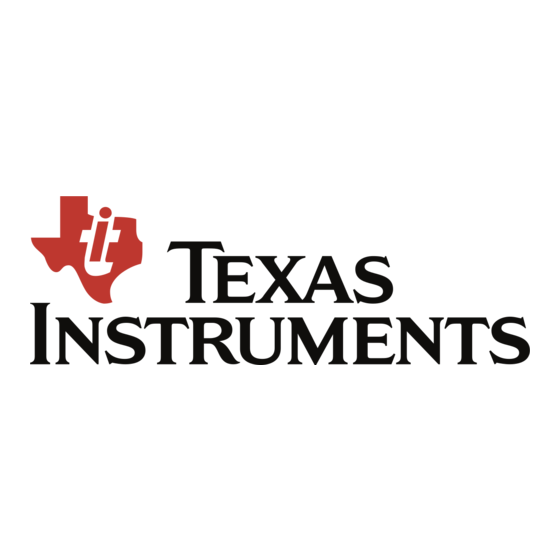Summary of Contents for Texas Instruments CC1111
- Page 1 CC1111/CC2511 USB HW User’s Guide swru082b Downloaded from Elcodis.com electronic components distributor...
-
Page 2: Table Of Contents
swru082b Table of Contents Introduction............................3 About this Manual..........................3 Acronyms ............................3 Definitions............................4 Getting Started..........................5 Using SmartRF04EB as an In-Circuit Emulator (ICE)..............7 The Debug Interface ........................7 USB Dongle Hardware Description ....................8 User Interface ..........................9 USB Interface ..........................9 Debug Connector........................9 General Purpose I/O Connectors ....................9 Cutaway Section........................10 RF Performance of Antenna......................10 USB Dongle Reference Design and Schematics ................10... -
Page 3: Introduction
Thank you for purchasing a development kit for Low Power RF System-on-Chips from Texas Instruments. About this Manual This manual covers the CC1111 USB Dongle or the CC2511 USB Dongle found in the CC1110- CC1111DK/CC2510-CC2511DK development kits. Both these USB dongles are also available separately as the CC1111EMK868-915 and CC2511EMK evaluation module kits. -
Page 4: Definitions
Figure 1. Kit Hardware Component Overview System on Chip. A collective term used to refer to Texas Instruments ICs with on-chip MCU and RF transceiver. Used in this document to reference the CC1111/CC2511 and the CC1110/CC2510. In Circuit Emulator. ICE functionality is built into the SmartRF04EB. -
Page 5: Getting Started
“I/O B” connector on SmartRF04EB to power the dongle from the EB (see Figure 3). The CC1111/CC2511 USB Dongle should only be powered by one of the two sources at a time. Do not connect the USB cable to the USB Dongle while it is powered from the SmartRF04EB. The SOC_DEM has a voltage level converter on the P3 connector, so the SmartRF04EB and the USB Dongle may have a different power supply voltage. - Page 6 Figure 4. SmartRF04EB Power Switch, Power On The CC1111/CC2511 can now be programmed with the SmartRF Flash Programmer software. The firmware on the CC1111/CC2511 can also be debugged using the IAR Embedded Workbench debugger. Please see the SmartRF Flash Programmer [2] user manual for more details.
-
Page 7: Using Smartrf04Eb As An In-Circuit Emulator (Ice)
SmartRF04EB or other 3rd party programming tools. The USB Dongle can be used as a reference. Please see the CC1110/CC2510/CC1111/CC2511 section of the TI web site for an updated list of 3rd party programming tools. -
Page 8: Usb Dongle Hardware Description
PCB track Line marking connector cutaway section of the dongle Button Debug connector GPIO test pins Figure 8. CC1111 USB Dongle, (top view) Alternative debug connector Figure 9. CC1111 USB Dongle, (back view) 8/12 Downloaded from Elcodis.com electronic components distributor... -
Page 9: User Interface
General Purpose I/O Connectors All GPIO pins on the CC1111/CC2511 SoC that are not used on the USB Dongle are routed to the P4 “Test pins” pin-row. They can be used for debugging or to connect external devices to the CC1111/CC2511. -
Page 10: Cutaway Section
While the CC2511 USB Dongle has a PCB antenna designed as a meandered inverted F antenna, the CC1111 USB Dongle has a chip antenna with a PCB track added for tuning of the resonant frequency. The performance of the PCB antenna on the USB Dongle will be affected by its nearby surroundings. -
Page 11: References
CC USB Software Examples User’s Guide (swru222) AN032 – SRD Regulation for License-Free Transceiver Operation in the 2.4 GHz Band (swra060) AN043 – Small Size 2.4 GHz PCB Antenna (swra117) CC1111 USB Dongle Reference Design (swrr049) [10] CC2511 USB-Dongle Reference Design (swrc062) 11/12 Downloaded from Elcodis.com... -
Page 12: General Information
swru082b 11 General Information 11.1 Document History Revision Date Description/Changes SWRU082B 2009.07.31 Updated hardware pictures and corrected a few typos SWRU082A 2009.05.08 Renamed. Moved software sections to swru222.pdf SWRU082 2006.07.06 Initial release 12/12 Downloaded from Elcodis.com electronic components distributor... - Page 13 IMPORTANT NOTICE Texas Instruments Incorporated and its subsidiaries (TI) reserve the right to make corrections, modifications, enhancements, improvements, and other changes to its products and services at any time and to discontinue any product or service without notice. Customers should obtain the latest relevant information before placing orders and should verify that such information is current and complete.








Need help?
Do you have a question about the CC1111 and is the answer not in the manual?
Questions and answers